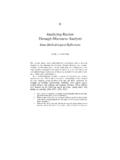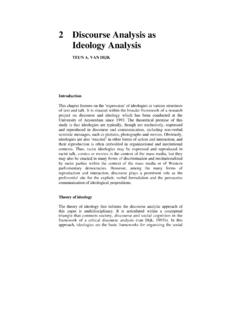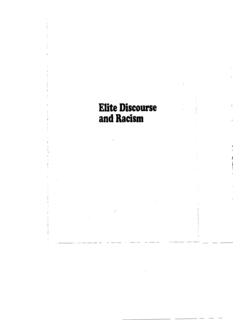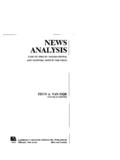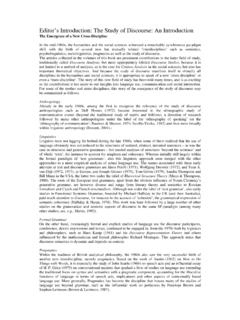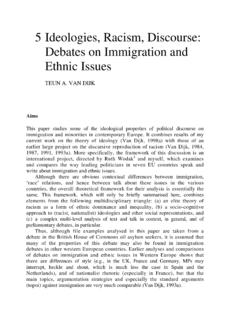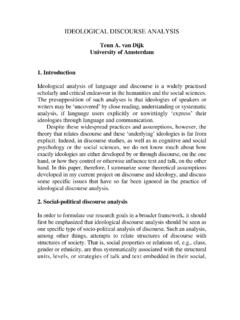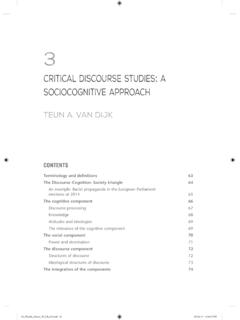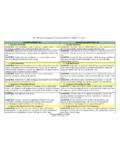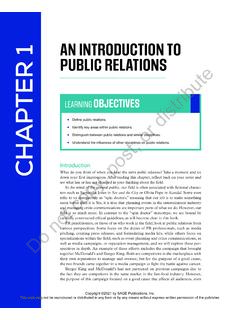Transcription of Power and the News Media - Teun A. van Dijk
1 1 Power and the News Media Teun A. van Dijk University of Amsterdam _____ INTRODUCTION In the study of mass communication, there has been a continuous debate about the more or less powerful effects of the Media on the Instead of reviewing these positions and their empirical claims, this chapter examines in more general terms some properties of the social Power of the news Media .
2 This Power is not restricted to the influence of the Media on their audiences, but also involves the role of the Media within the broader framework of the social, cultural, political, or eco-nomic Power structures of society. In order to focus this discussion bet-ter, I limit it to the news Media , and in particular to the press, thus ignoring the undoubtedly pivotal role of television and other Media gen-res in mass Political Communication in Action 10 The theoretical framework for this inquiry is articulated within the multidisciplinary field of discourse analysis.
3 A domain of study in the humanities and social sciences that systematically examines the structures and functions of text and talk in their social, political, and cul-tural Applied to the study of mass communication, this approach claims that in order to understand the role of the news Media and their messages, one needs to pay detailed attention to the struc-tures and strategies of such discourses and to the ways these relate to institutional arrangements, on the one hand, and to the audience , on the other For instance, topics or quotation patterns in news reports may reflect modes of access of various news actors or sources to the news Media .
4 Whereas the content and form of a headline in the press may subtly influence the interpretation and hence the persuasive effects of news reports among the readers. Conversely, if we want to examine what exactly goes on if it is assumed that the Media manipulate their readers or viewers, we need to know under what precise conditions, including structural properties of news reports, this might be the case.
5 Power A brief conceptual analysis is needed in order to specify what notions of Power are involved in such an approach to the role of the news Media . I limit this analysis to properties of social or institutional Power and ignore the more idiosyncratic dimensions of personal influence, for example, those of individual journalists. Thus, social Power here will be summarily defined as a social relation between groups or institutions, involving the control by a (more) powerful group or institution (and its members) of the actions and the minds of (the members) a less powerful Such Power generally presupposes privileged access to socially valued resources, such as force, wealth, income, knowledge, or status.
6 Media Power is generally symbolic and persuasive, in the sense that the Media primarily have the potential to control to some extent the minds of readers or viewers, but not directly their Except in cases of physical, coercive force, the control of action, which is usually the ultimate aim of the exercise of Power , is generally indirect, whereas the control of intentions, plans, knowledge, beliefs, or opinionsthat is, mental representations that monitor overt activitiesis presupposed.
7 Also, given the presence of other sources of information, and because the Media usually lack access to the sanctions that othersuch as legal or bureaucratic-institutions may apply in cases of noncompliance, mind control by the Media can never be complete. On the contrary, psy-chological and sociological evidence suggests that despite the pervasive Political Communication in Action 11 symbolic Power of the Media , the audience will generally retain a mini-mum of autonomy and independence, and engage more or less actively, instead of purely passively, in the use of the means of mass In other words.
8 Whatever the symbolic Power of the news Media , at least some Media users will generally be able to resist such persuasion. This suggests that mind control by the Media should be particu-larly effective when the Media users do not realize the nature or the implications of such control and when they change their minds of their own free will, as when they accept news reports as true or journal-istic opinions as legitimate or correct.
9 Such an analysis of social Power and its symbolic dimensions requires going beyond a narrow social or political approach to Power . It also involves a study of the mental repre-sentations, including so-called social cognitions such as attitudes and ideologies, shared by groups of readers or viewers. If we are able to relate more or less explicitly such mental representations, as well as their changes, to properties of news reports, important insights into Media Power can be gained.
10 Well-known but vague notions such as influ-ence or manipulation may then finally be given a precise meaning. Within a more critical perspective, many analyses of social Power , including those of Media Power , usually imply references to Power abuse-that is, to various forms of the illegitimate or otherwise unacceptable exercise of Power , given specific standards, norms, or val-ues. For instance, manipulation as a form of Media Power enactment is usually evaluated in negative terms, because mediated information is biased or concealed in such a way that the knowledge and beliefs of the audience are changed in a direction that is not necessarily in its best interest.
